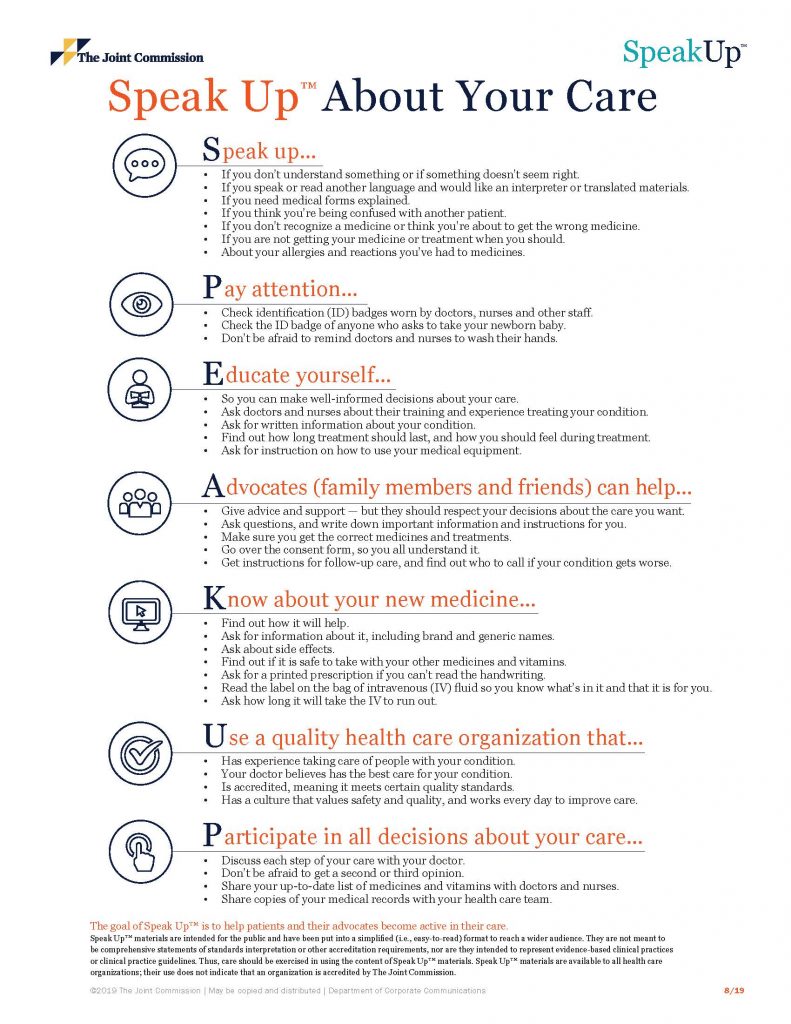Adapting to Caregiving requires a Knowledge of Healthcare Operations
Although knowing legal rights is important, understanding medical terminology and how hospitals function is critical when navigating anything related to healthcare. Entering the world of healthcare is like entering a foreign country. Health care workers speak their own language. Their hierarchy of leadership and authority is strictly defined. Without an understanding of who’s who, you can become lost in how to get things done.
Furthermore, rules and regulations are detailed and restrictive. Unless you know what to and not to do, it is easy to run afoul of their rules. The world of healthcare is a dangerous place for family caregivers and your family member if you are not well-versed in knowing how to be a patient advocate. Unless you know how to speak out when you know something is not being handled correctly, your family’s safety may be at risk. I have personally saved my husband’s life by speaking up on more than one occasion.
https://www.jointcommission.org/
Healthcare Regulations
Whether single hospitals or large enterprises, healthcare systems are regulated and licensed by the same basic organizations; therefore, healthcare regulations have standards of care and consistent regulations. For instance,
- The Joint Commission accredits all healthcare systems that receive Medicare reimbursement.
- State Professional Boards license all healthcare professionals like doctors and nurses.
- All pharmacies are monitored by the Drug Enforcement Administration, the Occupational Safety and Health Administration, and the Centers for Medicare and Medicaid Services (CMS), to name a few.
- CMS (Centers for Medicare and Medicaid Services) and the Office of the Inspector General (OIG)
- regulate any facility that accepts Medicare, Medicaid, or CHIP.
- OSHA (Occupational Safety and Health Administration) covers all workplaces, including hospitals.
Since all of them must follow the same rules, most use similar words to describe their rules and medical jargon, have a similar leadership chain of command, comply with the same standards of practice, and often have a similar complaint process. HOWEVER! While the rules are similar, they are not the same. Often localities use their own words and phrases. You, therefore, must check out the rules for yourself! Don’t make assumptions.
Complaints
While there are some differences from place to place, once you know the basics, the ability to recognize the standards and violations begins easy. Therefore, if you feel that your rights are under attack, you can ask a leader for help in finding out what to do to access any of the above complaint processes.
Who’s in Charge?
If you’re new to an organization and you’re trying to figure out who an unknown person might be, here are some tips for making an identification:
- When making rounds, a “Chief” or “Head” Doctor (the ones who have finished residency and are attendings) is the one walking in the front of the group or sitting at the head of the table. If not at the head, he is sitting directly to the head’s immediate right or left. (His nametag has MD after his name or shown on his lab coat.)
- The Chief Executive Officer or President leads the organization, is always in a suit, usually sits at the head of the table, and expects everyone to bring them whatever they need. Their job is to keep the system financially stable.
- The administrators/Vice Presidents do likewise.
- Nurses are the ones in charge hour by hour in the nursing units. They are responsible for making sure the patient stays safe and gets well.
- Therapists treat “something” – physical therapy, respiratory therapy, occupational therapy, etc.
- Technicians run the equipment – Radiology technician, laboratory technician, EEG technician, etc.
- Aides, assistants, and partners assist – assist other healthcare professionals and assistants.
Staying at the Hospital
Being a caregiver in a hospital environment is different from being a visitor. Caregivers often stay overnight with patients. I once stayed with Lynn at the hospital without going home for a month without a break, getting an exchange of clothes and supplies from my family as needed. Living in a hospital is a different experience.
When you need to survive as a visitor in a room, it’s helpful if you’ve talked to others who have also had to camp out in a patient room before. Having done it often, I automatically know what to pack.
- I store my soaps and shampoo products in bottles so I can wash them in public restrooms.
- Non-perishable food and beverages in case I can’t go to the cafeteria to get meals.
- I keep my medications sorted in baggies, with each day kept separately.
- Non-skid for foot protection and to decrease direct contact with the floor (think hospital germs on the floor—yuck)
- A sleep mask and earplugs because hospitals never sleep.
- Cell phone, charger, my computer or tablet, and their chargers, and a safety extension since you’ll be plugging into patient care plugs.
- My pillow – the nursing unit will usually share unit linens with families but not disposable pillows due to the cost. Bring spare pillowcases for germ covering.
I bought a fold-up wagon to transport these items, plus what I need for Lynn to and from our room and an electric cooler to store food and drinks in the room. I take all the above plus my clothes just for me.
In addition, I pack a bag (or two) for Lynn. I’ve discovered several items at our local hospital that they don’t keep on hand that Lynn needs for his routine care. I bring those items with me. I keep a supply pre-labeled or label a new batch if he started to act sick, so it’s obvious which are ours and what belongs to the hospital. He also uses special support pillows and other comfort products they don’t carry that I take with us. Each of them I label, so it’s obvious they belong to us. By the time I load our van to leave, it appears we’re moving in (or out).
Understanding Healthcare is necessary to Becoming an effective Patient Advocate
When you take on the role of caregiver, you become responsible for your family member’s daily care duties, but you also become their advocate. Understanding healthcare is essential to work within the medical environment in getting anything done. Healthcare systems are complex. A strict reporting line of leadership exists, and roles are well defined. Staff only do what is in their job descriptions, so it’s pointless to ask them to do something else. Therefore, if you need help, you must know whom to ask for what.
Healthcare Highly Regulated
Clinical teams are strictly regulated. Laws and regulations rule everything; therefore, asking them to do anything out of the ordinary takes an act of Congress. By the time it’s approved, you may not even need it. There’s red tape on top of red tape, and decisions can’t be made without a “multi-disciplinary” committee reviewing the request and three layers of approval blessing the decision.
Healthcare Places a Lot of Emphasis on Education
Educational levels are a big deal with all disciplines these days, and credentials speak volumes. Therefore, unfortunately, many professionals tend to look down on their customers without college education. They assume they cannot understand information, talk over them, or lead them in making decisions a particular way without all the facts. They fail to explain the lab reports and imaging results (X-rays, CTs, or MRIs). The medical staff and the nursing leaders often talk “down” to the caregivers and family in a condescending manner. Therefore, knowing the healthcare language and talking the talk is essential. If you can hold your own in a conversation on the health topic under discussion, you will earn their respect, and they will include you after that.

Family Controls Medical Care
Remember, you and your family member are the captains of this ship—not the medical team. They work for you and not the other way around. You know your family member’s history better than anyone. You know how they are responding better than anyone. Stand your group if you believe they need something different from what the doctor advises. Make them listen and talk to you.
Decision Making Authority
You may have to prove you are the Power of Attorney (POA) or Medical Decision Maker for your family member to make the necessary decisions if your family member cannot make their wishes known. If you do not have legal authority, you need it before healthcare officials recognize your right to speak on behalf of your family member. No one will listen to you if you do not have that unless your family member is legally declared incompetent or has died. Chances are you do not want either to occur; therefore, a POA is the next best choice.
Power of Attorney Designation
Once you establish yourself as the POA and the family member defers all conversations with you, the medical community will begin to work with you. However, it’s good to keep a copy of your POA document with you to present whenever you meet with a new healthcare person for the first time because healthcare personnel does not talk to one another. You almost always repeat your story multiple times down the line, which includes showing the same documents to each of them along the way.
Always Keep These Documents with You
Take a copy of the following documents with you every time you go to the hospital or doctor’s office:
- your Power of Attorney,
- your family member’s insurance cards,
- government-issued identification card (driver’s license),
- a list of all prescribed medications,
- over-the-counter medicine they take,
- diet supplements (vitamins, minerals, etc.), or
- herbal supplements (home remedies).
If your family member has any implants or transplants, keep the essential information about those with you. I have a zipper pouch to store mine and update the contents after each medical appointment with any changes made to his medication list to stay current.
The Medical world Has unwritten cultural do’s and don’t
Patient Responsibilities
When you enter a healthcare facility to receive care, the fact that you voluntarily came to them for help implies consent for treatment and establishes an agreement between you and them for services. Therefore, from the minute you come there with the intent of being a patient, you have specific responsibilities. If you do not intend to accept the help the healthcare team offers, if it’s reasonable, then do not go there. If you have an issue with the assistance provided, discuss your concerns with them in a respectful manner.
Most healthcare professionals are genuinely in the profession to help people and to do the best they can every day in a difficult situations. If you talk through a position with them, you can work something out most of the time.
As a patient, you are responsible for the following:
- Completing your admission and billing paperwork accurately.
- Ask questions if you do not understand something and let your doctor know if you do not want to follow a plan of care.
- Give your doctor and the hospital a copy of your advanced directive if you have one.
- Following your plan of care, once you go home, including buying the supplies, medications, and other items, you need to take care of yourself.
- Leave your valuables at home so they do not get lost at the hospital.
- Being respectful to everyone, following the rules, and being safe.
- Paying your bills as agreed.

When you understand the healthcare principles, it even helps you figure out where services within buildings might be offered.
Understanding Healthcare – You are the Most Valuable Member of the Team
Key Player in Healthcare Team
As the caregiver, you are one of the most important members of the healthcare team. You may be the most important other than the patient because you are the only one who knows the entire story. You know what is going on from all sides – at home, at the hospital, at every doctor’s office, at every therapist’s office, and with the insurance companies. You also have a past medical history and know first-hand (because you experienced it) what treatments worked since the last visit with the doctor. In fact, you might know better than the patient at times because the patient may have been confused during part of recovery, currently, or not want to tell the doctor the truth.
MVP – Most Valuable Player
You are a wealth of knowledge. You may not realize how much you know, but you are invaluable to the healthcare team—often more so than they realize, as well, which is why I want you to learn how to talk the talk with them so they will listen to you. One of your greatest challenges will be to get some of the doctors to respect you and see your value to them. That’s not true of all of them, but many of them will talk over you. Don’t let them. When they make assumptions or say things that are not true about your situation at home, correct them. When they want to do something that will not work for your situation at home, speak up and say so. Ask questions and involve yourself in helping to make the decisions about your family member’s care.

Speak the Truth; They Need to Know
When my Mom had cancer, she was somewhat uncomfortable most of the time; however, every time I took her to see her Oncologist and the doctor asked her how she was doing, my Mom responded with a cheery, “I’m doing great and how are you?”

Why would she do that? She was obviously in pain. The answer was because she LOVED her doctor. She could not stand to disappoint her doctor by saying she felt terrible. The doctor understood my Mom and would instead ask me for details about her condition.
Clarify Misunderstandings
As the caregiver, sometimes, you must be the truth-teller. Patients sometimes need to live in denial for a while as they adjust to different stages of illness. Other times confusion or memory loss interferes with accurate storytelling requiring the caregiver to intervene. I often allow the one under my care to relay their story first, and then I supply details to clarify misinformation as needed. Occasionally the person under my care and I can’t entirely agree on the details. Usually, the doctor explores the differences in more depth to determine where the difference lies if knowing whose right matters.
Truth is Vital
It is vital to give healthcare providers pertinent information related to changes occurring since the last visit. A change in behavior or primary body function can indicate something to a healthcare provider that a layperson would not consider. Intermittent events often serve as warning signs of something more serious about to happen. As a caregiver, our job is to give the doctor the details and decide what is pertinent. Therefore, tell them everything.
Process for Filing Complaints about Healthcare Concerns
All hospitals are licensed by the Department of Health and accredited by the Joint Commission. If you have a complaint or concern, contact the Patient Relations or Guest Services office first to see if they can help you resolve the issue. If your attempt to resolve an issue internally is not successful, you have several options for addressing your complaints outside the organization.
The Joint Commission
The Joint Commission investigates issues related to patient safety and quality of care. Go to their website at https://www.jointcommission.org/resources/patient-safety-topics/report-a-patient-safety-event/ to get the form you need to fill out and to find out more about filing the report.
The Virginia Department of Health
The Office of Licensure and Certification (OLC) investigates consumer complaints regarding the health care services received at the facilities and services it licenses or certifies. The OLC is responsible for nursing facilities, inpatient and outpatient hospitals, abortion facilities, home care organizations, hospice programs, dialysis facilities, clinical laboratories, and managed care organizations. To file a complaint go to http://www.vdh.virginia.gov/licensure-and-certification/complaint-unit/
The Center for Medicare and Medicaid Services (CMS)
You can file a complaint if you have concerns about the quality of care or other services you get from a Medicare or Medicaid provider. To submit a complaint to CMS go to their website at https://www.medicare.gov/claims-appeals/how-to-file-a-complaint-grievance
Board of Health Professions – Virginia
The Department of Health Professions receives complaints about Virginia healthcare practitioners who may have violated a regulation or law. Claims for all thirteen licensing and regulatory Boards are received and investigated by the agency’s Enforcement Division. For more information their website is https://www.dhp.virginia.gov/PractitionerResources/Enforcement/FileaComplaint/
Your Rights and Responsibilities
Caregiver Advocate for Patient Rights
As your family member’s power of attorney, you have the legal right to speak up on their behalf if you feel their patient rights are being violated when receiving care in a hospital, as an outpatient, in hospice care, or in another managed care facility. The Joint Commission established standards for patient rights applying to all healthcare organizations. The Joint Commission oversees all organizations that accept federal funding; therefore, these standards are consistently found throughout the United States as a fundamental right for all customers of healthcare services.
Let’s look at these Rights closer under “Rights to have Effective Communication” and “Rights to be Treated with Dignity.”
Your Responsibilities as a Caregiver
As a caregiver, it is vital that you have a thorough understanding of the healthcare system within which you function to safely navigate the potential pitfalls. When you enter a healthcare facility to receive care, the fact that you voluntarily came to that facility for help implies consent for treatment and establishes an agreement between you and them for services. It’s called “implied consent.”
With implied consent, the medical team can assume you want to accept care from them if you become unconscious and cannot speak up for yourself. The unspoken agreement also establishes an expectation of competent care from the healthcare team and responsible behavior by you. Therefore, from the minute you become a patient, you have specific responsibilities. If you do not intend to accept the help the healthcare team offers, if it’s reasonable, then do not go there. If you have an issue with the assistance provided, then discuss your concerns with them in a respectful manner.
Most healthcare professionals are genuinely in the profession to help people and to do the best they can every day in a difficult situations. If you talk through a position with them, most of the time, you can work something out.
You are responsible for the following:
- Completing your admission and billing paperwork accurately.
- Asking questions if you do not understand something and let your doctor know if you do not want to follow a plan of care offered.
- Giving your doctor and the hospital a copy of your advanced directive if you have one.
- Your plan of care, once you go home, including buying the supplies, medications, and other items, you need to take care of yourself.
- Leaving your valuables at home, so they do not get lost at the hospital.
- Being respectful to everyone, following the rules, and being safe.
- Paying your bills as agreed.
Right to be Treated with Dignity
As a consumer of healthcare services, caregivers always have a right to be treated with respect, as does the family member under their care.
- To be treated with courtesy and respect by everyone who represents the organization and to not suffer denial of services or be mistreated based on any discriminatory reason including but not limited to race, color, gender, age, disability, sexual preference, nationality, political affiliation, marital status, religion, or genetic information.
- To practice your religious or spiritual beliefs and discuss those beliefs with those willing to do so.
- To know the names of the people who provide your care.
- To have your healthcare information remain private and confidential unless you authorize its release.
- To limit the use of any pictures or videos taken of you to what you approve or to assist in your care
- To have an advocate with them during their care
Rights to have Effective Communication
- To be informed about your care
- To have your healthcare team listen to you regarding how you feel about your medical needs
- To be allowed to make your own decisions regarding your treatment choices, including the right to refuse all or any part of any treatment you do not want to do
- To have the information provided to you in a way that meets your needs ( such as if you are hearing impaired, they need to provide you with an interpreter, or if you cannot see to read, you need to have information provided orally)
- To receive copies of test results and medical records (which includes the patient chart during the hospital stay or afterward)

